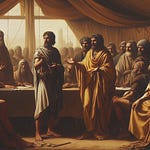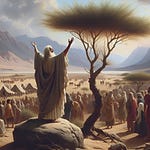Have you ever considered how memory shapes faith?
In Exodus 13, God institutes a lasting memorial of deliverance, teaching His people to remember their redemption.
Commentary
In this chapter, we move from the momentous departure from Egypt to God’s commands for Israel to commemorate their deliverance. The opening verses establish the consecration of the firstborn, a significant act that reminds Israel of God’s claim on their lives. Then, the Feast of Unleavened Bread is outlined, ensuring that future generations will recall how swiftly they left Egypt. Finally, the chapter closes with God leading His people—first through a detour, then with a visible manifestation of His presence in the pillar of cloud and fire.
vv. 1–2 - God commands that every firstborn, whether man or beast, be set apart unto Him. This act not only serves as a reminder of the final plague but also declares that everything Israel possesses belongs to God. The firstborn, often considered the strength and future of a household, is to be redeemed or sacrificed—a foreshadowing of Christ, the ultimate Firstborn who would be given for His people. The unclean animals typified sinful humanity, whereas the clean animals typified the promised Savior
vv. 3–10 - outline the institution of the Feast of Unleavened Bread, a feast that begins with Passover and continues for an entire week. The absence of leaven was a vivid symbol of Israel’s haste in leaving Egypt, since they could not wait for bread to rise. But more significantly, leaven in Scripture often represents corruption and sin. The removal of leaven, then, signified not merely a past event but an ongoing call to holiness. As a memorial, it helped the Israelites to look back at what God had done. But as a mandate, it helped the Israelites to look forward to what God wanted from them. Paul writes in 1 Corinthians 5:7-8, “Purge out therefore the old leaven, that ye may be a new lump, as ye are unleavened. For even Christ our passover is sacrificed for us: Therefore let us keep the feast, not with old leaven, neither with the leaven of malice and wickedness; but with the unleavened bread of sincerity and truth.”
vv. 11–16 - return to the theme of the firstborn, with explicit instructions that they must be redeemed or die. There is no third option. The example given is of a donkey, apt choice because of how descriptive it is of man: unclean and stubborn. Either the firstborn is redeemed with a substitute, or executed. This striking detail underscores the necessity of atonement: life must be given, either through a substitute or through judgment.
vv. 17–22 - The Israelites, taking with them the bones of Joseph, as he had urged at the end of Genesis, are led by God in a path that, from a human perspective, seems inefficient. Instead of the direct route to Canaan, He takes them through the wilderness. Why? First, because they were not ready to fight. Second, because returning to Egypt was a temptation to them, and God needed to help diminish it as an option by overthrowing the Egyptians in the Red Sea. And so, God leads them, not by instinct or by the perception of Moses, but the pillar of cloud and fire—a visible assurance that God Himself is leading them.
Application
Redemption demands remembrance. God did not merely deliver Israel from Egypt; He commanded them to remember it. Through God’s claim of the firstborn and the feast of unleavened bread, God helps His people to remember His redemptive work. In addition, the chapter also reflects that this return is according to divine promise, and Joseph’s bones function as a visible reminder. God knows that forgetfulness breeds faithlessness. This is why He has given the Lord’s Supper: “This do in remembrance of me.” Why? Because we are prone to forget, to grow cold, to lose the wonder of redemption. I encourage you to daily remember God’s deliverance in your life in saving your soul.
Spiritual freedom is not the absence of obligation. Many modern Christians misunderstand liberty. They assume that since Christ has freed us, we are free from duty. But notice: Israel was not freed to live as they pleased but to serve the Lord. This is why the firstborn must be consecrated—because God did not merely free them from Pharaoh, He claimed them for Himself. And even in the case of a firstborn donkey, it was not redeemed to run wild, but to live under its master. And so are we. Liberty in Christ is not freedom from obligation, but freedom unto obedience. Likewise, Christian, your redemption is not an invitation to autonomy but to worship. “Ye are not your own, for ye are bought with a price.” Live, then, as one who belongs to God.
Delays are often divine protection. Israel’s longer route to Canaan may have seemed unnecessary, but God was sparing them from a crisis they were not ready to face. And so it is in our lives. Sometimes God withholds a promotion, redirects a relationship, or prolongs a trial—not because He has forgotten us, but because He knows what would overwhelm us. Let this truth steady your heart. If God has you in the wilderness, it is not without reason. It’s not punishment. It’s preparation. Trust Him.
The Christian life is led by divine presence. The pillar of cloud and fire was a visible manifestation of God’s presence with His people. It assured them that they were the covenant people of God, and they were not wandering aimlessly. Even when they grieved God, the presence did not leave. This typified what is true for the genuine believer. Today, we do not have a pillar of cloud or fire, but we have the indwelling Spirit. He guides the people of God. Christian, do not live as though you must find your own way. Walk by faith, confident that God goes before you.
Christ is the Firstborn who redeems His people. The consecration of the firstborn in this chapter finds its ultimate fulfillment in Christ. He is the Firstborn of Mary, the Firstborn among many brethren, the Firstborn from the dead. And unlike the animals redeemed with a lamb, Christ was not spared. He was the Lamb. His life was given so that we might live. y question for you is, have you been redeemed? The firstborn of Israel had two options: redemption or death. We are not just unclean like the donkey—we are unable, unworthy, unfit. And yet He who was clean became unclean for us. He who was worthy bore the wrath for the guilty. Make sure you can sing with confidence, “I am redeemed, oh, praise the Lord! My soul, from bondage free, has found at last a resting place in Him who died for me!
“Did it ever strike you that man, according to the Jewish ceremonial law, is an unclean creature? Nothing was clean, according to the law of Moses, but that which divided the hoof and chewed the cud. Now man fails in one of these, and by the law he is put down as a sinner, as being on a level with the unclean beasts. What a wonder the Gospel does for us when, being redeemed with a price, we are said to be the sheep of God, the lambs of Christ’s flock, so that therein we bear the same name as the Lord Jesus Christ, Himself, and we are raised from the condition of the brute, into which sin brought us, and are made to sit far above principalities and powers, in the heavenly places in Christ Jesus!” — Charles Spurgeon











